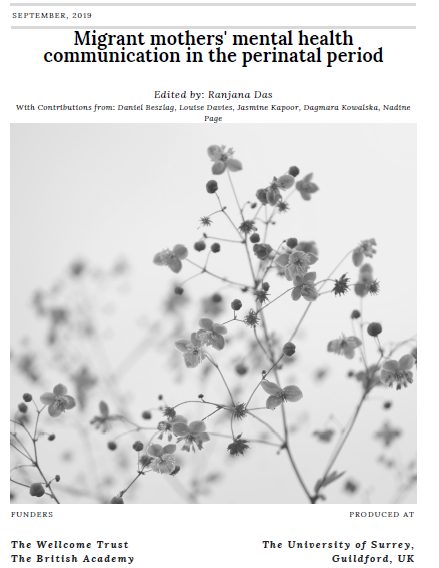By Ranjana Das
With contributions from Daniel Beszlag, Louise Davies, Jasmine Kapoor, Dagmara Kowalska, Nadine Page
On 20th September, we launched a new report on migrant mothers’ mental health communication in the perinatal period, at the University of Surrey, bringing together findings from qualitative interview-based research funded by the Wellcome Trust and the British Academy. The full report is available for download online, and this blog post highlights a few of the key findings the report speaks of.

Whilst recognising the pressing need to look at the perinatal period in migrant mothers’ lives, particularly given the significant gaps in culturally competent care, the report recognised that the term ‘migrant mothers’ should not be read as a monolith. As Beszlag’s evidence review demonstrates in the report, first generation mothers, forced migrant mothers, mothers in a poor material situation, those with limited access to digital technologies, and class, race and a range of other intersectional attributes significantly diversifies this significant site of analysis (Das, 2018; El-Khoury, et al, 2018; Fellmeth, 2018; Firth & Haith-Cooper, 2018)
As Beszlag, Das and Kapoor’s work on the interviews discovered, a few key themes arise in the findings –
- Damages of a ‘Child is a Blessing’ Discourse: Expectations and understandings of motherhood within the broader family cause a significant degree of pressure on women where the notion of the child being a ‘blessing’ necessitating maternal ‘sacrifice’ makes it impossible for mothers to foreground their own wellbeing and speak about their perinatal difficulties.
- “I think one of the worst things about it was that you’re not really meant to talk about it, because you’re meant to be so happy that you’ve given birth and you love your child, and you’ve got this blessing, and obviously you know …” Kaavya
- Isolation in a Sea of People: Contributory factors to mental health difficulties included maternal pressures around isolation and loneliness amidst a sense of feeling overwhelmed, surveiled and smothered by extended family. This is a particularly pertinent point for any contact with Health Care Professionals, because a large number of relatives surrounding the mother might easily be mistaken for a support network, when, in reality, this network might have mixed, or even negative implications for her.
- “I want to get out of the house, I feel like I’m stuck, I need to get out of the house, I need to shove her into a school, into a nursery, I need to, you know, get my life back” Tara
- Difficulties seeking help: The widely acknowledged stigma around mental health, particularly from older generations, the pervasiveness of the ‘child is a blessing’ discourse, lack of awareness of perinatal mental health difficulties and lack of information about sources of support made it significantly difficult for mothers to seek help even when they recognised the need for it.
- “they outcast you totally, they don’t do anything about … You’re treated more differently then.” Shona
- Difficulties surrounding interactions with healthcare professionals: Mothers recognised nurses and midwives to be a key source of support, but they spoke on numerous occasions about the need for continuity of contact, so as to not have to repeat their stories to different people, and they recognised the impact of heavy caseloads on Health Visitors’ hands leaving them less time for a detailed conversation in the midst of significant paperwork to fill out.
- The mixed role of technology:Technology was often significant for many migrant mothers, but, for those in difficult material circumstances this often meant a reliance on male partners’ funding calling cards to be able to call families, and a significant reliance on internet telephony. Apps were also significant for many mothers who seemed to only use the internet for information rather than connection.
- Harini, spoke of significant isolation, and of venturing online to find information – but what became significant for her in the end was audio-calls and mobile telephony – serving on the one hand to connect her to one or two key relatives, but arguably, disconnecting her from a potentially wider network of support, albeit, as we have seen, uneven in nature.
Page and Davies suggest useful recommendations from the perspectives of Health Care Professionals. Their interviews with HCP reveal a sense of the need for better practice – If I could go back I would change my practice. It was very mechanical then”; “I would have tried to develop a relationship by visiting women at home for longer”; “I would have facilitated more open communication”; “I would communicate without fear that their first language was not English. Their recommendations include education for all health care professionals at both pre and post registration levels in terms of health care needs of migrant women; a multidisciplinary approach to understanding and awareness of cultural differences; developing therapeutic relationships and building rapport with migrant women and engaging migrant women in mental health services.
Discussions revealed the particular necessity to train HCP in the use of online platforms and services, but not in isolation from the offline, and recognising that online ‘solutions’ need sustained work but do not always guarantee uniform outcomes for everyone. For more, please download the report from this link.
Please note: Blog entries reflect the personal views of contributors and are not moderated or edited before publication. However, we may make subsequent amendments to correct errors or inaccuracies.
